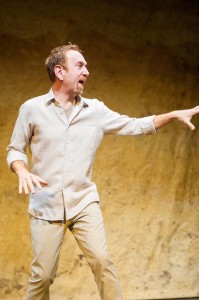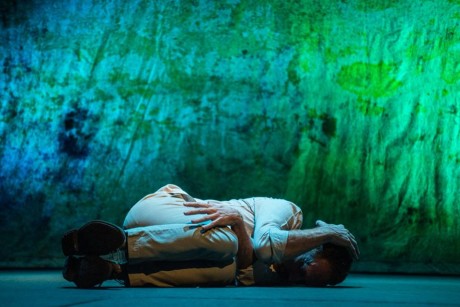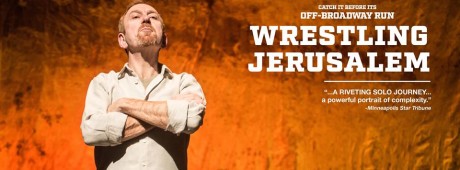Aaron Davidman’s deeply personal solo performance, Wrestling Jerusalem, the opening gambit in Mosaic Theater’s Voices from a Changing Middle East Festival, takes its audience deep into the psychological space that is the Israeli/Palestinian Conflict.
You won’t be bombarded with facts or historical events, about who started what or who killed whom, or about this tragedy or that massacre, or this “evil” deed or that morally superior person.

Instead, writer and performer Davidman and Director Michael John Garcés give Wrestling Jerusalem a different mission, a spiritual one, a quest not for some great Holy Grail but a far more complicated one: what does it mean to be human in a land lost in an endless war? Or, more specifically, what does it mean to be Jewish in America, in Israel, in the Occupied Territories, in the Settlements during these most troubled of times?
Wrestling Jerusalem might not knock your socks off with its emotional fireworks, but its intense “wrestling” with this most fundamental of ethical questions will engage you at your best, and at your most protean: with your sense of Self and Becoming.
Early on, as Davidman enters the second minute of his litany of possible responses to the question: How did the Israeli-Palestinian Conflict begin (moving ever more rapidly from the First Intifada to the Seven Day War to the original UN Action, in which the US and the European powers fiddled with land that wasn’t theirs to fiddle with, so on and so forth), one begins to realize the point-of-view that Wrestling Jerusalem will take.
Assigning blame for a 68-year-old conflict with its numerous wars, Intifatades, missile attacks, jet fighter attacks, violations of human rights, additional settlements, bombings, invasions, etc., would be comic if it weren’t so damn tragic.
Davidman is not interested in blame. He is interested in how to “BE”.
The “Aaron” of the script begins his quest in a neutral position: he is a Jew who has decided to discover himself within Judaism. He goes to Israel to study; he holds no firm opinion on The Conflict. He lands at the Ben Gurion Airport, kisses the tarmac (it’s hot, by the way, and it burns his lips—and, yes, there are many funny moments in the play), and his search for answers begins.
Nephelie Andonyadis provides a setting for the production. Dominating our view is a large upstage image, an abstract image, as in modern abstract art, as in subjective space, the realm where all facts flow once a person has digested them.
During intervals between character sketches, Davidman adds his body and his shadow to the modern abstraction. With choreography by Stacey Printz, which is more image than movement, “Aaron” is painted on the Jerusalem canvas. Allen Wilner’s lights added dramatic shadows and fabulous colors to the various montages. Nuanced Sound was by Bruno Louchouard.
These stylized portraits convey an “Aaron” in states of psychological distress, as he discovers various aspects of the Judaism that has come to occupy Israel and the Occupied Territories and the Settlements.
The subjective terrain of Wrestling Jerusalem occupies the space that is normally reserved for poetry, the subjective interior where internal conflicts wrestle it out, for dominance, for clarity, for wholeness.
Davidson offers us a vision of those subjectivities, of the people who came to occupy his inner most being, of the people who offered him their perspectives on The Conflict, on the horror, on what it means to be living in an occupied space and what it means to be Jewish.
Davidson assumes these numerous characters, sometimes in conflict with “Aaron”, the man on the quest, sometimes simply living their lives in close proximity to “Aaron”, as he makes his journey, first to Jerusalem, then to Ramallah, then to Hebron, so on and so forth.
Davidson does not perform these “characters” as an actor would, but as a man who wants to embody their perspectives so as to ingest them. In other words, he does not give them a distinct pose or particular tic. Instead, these characters have passionate perspectives on life, on love, on what it means to be human in a war zone.
As a result, the play’s “Aaron” becomes the world of Israel and the Occupied Territories—the people, the perspectives, the pain.
On the ten-minute trip from Jerusalem to Ramallah, which took hours because of the checkpoints, “Aaron” is surrounded by Walls and Guard Towers and Soldiers and Barbed Wire. He flashes on images of concentration camps, and the horror sends chills through his body.
The beauty of Wrestling Jerusalem is not in its declarations, but in its willingness to respond spontaneously and fearlessly, even naively at times, to an entrenched, festering terror, to a terror around which most “experts” have mountains of accusations and well articulated positions, but in the end very little wisdom.
Davidman gives us the wisdom. As Socrates said: “The only true wisdom is in knowing you know nothing”—nothing, that is, but oneself.
And that’s the power of Wrestling Jerusalem.

One of the final characters “Aaron” meets on his quest delivers the evening’s most powerful, and meaningful monologue.
A man speaks to “Aaron” about his faith, his Judaism. No matter what happens around him, in a world gone mad with violence, he will hold fast to his “Judaism.” He will believe not the one God, but the God that is One.
The passion of the man fills the stage, as well as the pain that he feels as he watches so many of his brethren forget that most important difference.
The auditorium resonates with his anguish as he repeats the sentence: “This is not my Judaism!”
Indeed, you will leave this theatrical meditation with your own reflections on what it means to be human.
Running Time: 85 minutes, with no intermission.
Wrestling Jerusalem plays through January 24, 2016 at Mosaic Theater Company of DC performing in the Lang Theater at Atlas Performing Arts Center – 1333 H Street NE, in Washington, D.C. For tickets, call the box office at (202) 399-7993 ext. 2, or purchase them online.
RATING:





